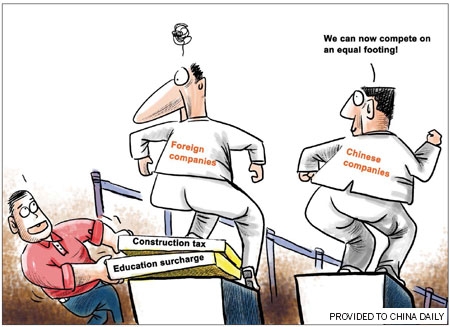Beijing seeks to address US concerns in Asia
Updated: 2010-12-02 06:56
By Wu Jiao and He Wei (China Daily)
BEIJING - China on Wednesday made diplomatic efforts to smooth over Washington's nervousness over what it sees as a challenge in the Asia-Pacific region by a growing China.
Meanwhile, China also warned against any outside meddling in territorial disputes between China and other countries in the region, hinting at US interference.
"It is important to note that China-US relations in Asia and Pacific region should be cooperative and win-win - not a zero-sum game," Foreign Minister Yang Jiechi told the Lanting Forum held in the Blue Hall of the Foreign Ministry compound in Beijing on Wednesday afternoon.
The event, themed on the Asia-Pacific situation and China's Asia-Pacific policy, represents the first time the Foreign Ministry has sponsored such a public forum.
Yang said China and the United States could properly solve their problems through candid dialogues, instead of confrontation.
Yang said territorial and maritime disputes between nations should be peacefully resolved between the parties directly involved through bilateral negotiations.
Yang told his audience of diplomats and academics that - based on the consensus already reached and through the open channels of dialogue - the parties will be able to properly address their own issues with their own efforts.
All countries should play a constructive role and refrain from creating new trouble and tension or complicating the matters, Yang said.
In its latest bid to further step up its presence in the region, the US launched a four-day joint naval drill with the Republic of Korea (ROK) in waters west of the divided Korean Peninsula.
The US aircraft carrier, the USS George Washington participated. It was the fifth joint military drill between the two countries this year.
At the forum, Yang called on countries in the Asia-Pacific region to forge a new security concept as "international security threats to today's world are more complex and diverse".
"Security issues are increasingly interrelated, affecting more areas than before," he said. "No one can single-handedly resolve regional security issues."
"We must foster a new security concept featuring mutual trust, mutual benefit, equality and coordination," said Yang. "We need to respect the security of our own countries, and also the security of others and (consequently) promote common security."
Yang also said that China welcomes a US presence in the region - yet wishes that Washington plays a constructive role in regional peace and stability.
The US has been increasingly uneasy about a growing China in the region, signaling its return to Asia-Pacific region since last year, with its leaders taking more intrusive postures in China-related regional affairs.
US Secretary of State Hillary Clinton said in a July regional summit in Hanoi that it is of US national interest as to solve the South China Sea dispute - as China, Vietnam, Malaysia, the Philippines and Brunei have competing claims in the South China Sea.
Beijing has always preferred to keep bilateral problems at the bilateral level to avoid a more complex situation, say analysts.
Indeed, strategic competition between Beijing and Washington resulted from a growing gap of misperception, according to Yuan Peng, an expert on US studies with China Institutes of Contemporary International Relations.
The misperceptions, Yuan pointed out, are caused by the minor - but notable - shift of power between China and the US in the Asia-Pacific region, leaving a highly alert Washington over-interpreting the intentions of Beijing.
"Therefore China's reasonable countermeasures, resorts and interests are regarded by the US as going tough and aggressive," Yuan said.
Beijing has also made clear its unhappiness with comments Clinton made with the Japanese foreign minister in November - that the Diaoyu Islands are covered under a US-Japan mutual defense pact.
A statement on the Foreign Ministry's website said Yang told Clinton that the US should act with discretion and avoid "irresponsible remarks" on this sensitive issue.
Nevertheless the mainstream of the bilateral ties will still remain positive, cooperative and comprehensive despite recent rows, Yuan added.
This will certainly be the case as Washington receives President Hu Jintao early next year in the US. At that point, Hu will have met US President Barack Obama for the eighth time since he took office two years ago.
Yuan said he believed the key to more benign Sino-US relations is a mutual strategic reassurance, creating a win-win atmosphere through extensive cooperation within the region at large.
Another plausible way for the two regional giants to achieve genuine peaceful coexistence, Yuan said, is to gradually form a code of conduct to properly address thorny issues such as revival of military contacts and cross-Straits relations.
Yuan also agreed that the behaviors of other regional players and incidents such as the Cheonan incident have also added the complexity of the still-troubled Sino-US relations.
China Daily
(China Daily 12/02/2010 page11)
Paper's Digest

Xi'an – more than just clay soldiers
There is more to the ancient capital of Xi'an than just clay soldiers.
Preview of the coming issue
Showing face: Looks can kill
China fueling European recovery
Specials

The naked truth about nude art
A growing number of Chinese people are now choosing to go nude for posterity, particularly young women and new brides.

"China lover"
Lord Mandelson says he has been called a "China lover" as a term of abuse back in Europe.

Firms unfazed by new taxes
Foreign investments into China are not expected to be adversely affected by the cancellation of some of the country's preferential tax policies.
